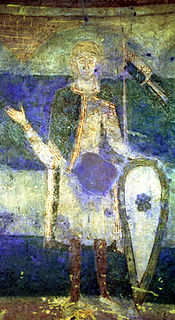 W
WAdalrich, also known as Eticho, was the Duke of Alsace, the founder of the family of the Etichonids and of the Habsburg, and an important and influential figure in the power politic of late seventh-century Austrasia.
 W
WAldegisel, Aldegisl, Aldgillis, Aldgisl, Aldgils or Eadgils was the ruler of Frisia in the late seventh century contemporarily with Dagobert II and a very obscure figure. All that is known of him is in relation to the famous saint that he harboured and protected, Wilfrid, but he is the first historically verifiable ruler of the Frisians. What the exact title of the Frisian rulers was depends on the source. Frankish sources tend to call them dukes; other sources often call them kings.
 W
WAnund Swedish: Bröt-Anund meaning trail-blazer Anund or Anund the Land Clearer; alternate names Brøt-Anundr or Braut-Önundr was a semi-legendary Swedish king of the House of Yngling who reigned in the mid-seventh century. The name would have been Proto-Norse *Anuwinduz meaning "winning ancestor".
 W
WDagobert II was the Merovingian king of the Franks ruling in Austrasia from 675 or 676 until his death. He is one of the more obscure Merovingians. He has been considered a martyr since at least the ninth century.
 W
WDervan or Derwan was an early King of the Sorbs.
 W
WIngjald illråde or Ingjaldr hinn illráði was a semi-legendary Swedish king of the House of Ynglings, son and successor of King Anund, and the father and predecessor of King Olof Trätälja. As with many of the 5th-7th century Yngling Kings of Uppland, his historicity is contested.
 W
WSamo founded the first recorded political union of Slavic tribes, known as Samo's Empire, stretching from Silesia to present-day Slovenia, ruling from 623 until his death in 658. According to Fredegarius, the only contemporary source, Samo was a Frankish merchant who unified several Slavic tribes against robber raids and violence by nearby settled Avars, showing such bravery and command skills in battle that he was elected as the "Slavic king". In 631, Samo successfully defended his realm against the Frankish Kingdom in the three-day Battle of Wogastisburg.
 W
WSeaxburh, also Saint Sexburga of Ely was a Queen as well as an abbess, and is a saint of the Christian Church. She was married to King Eorcenberht of Kent.
 W
WSigebert III was the Merovingian king of Austrasia from 633 to his death around 656. He was described as the first Merovingian roi fainéant —do-nothing king—, in effect the mayor of the palace ruling the kingdom throughout his reign. However he lived a pious Christian life and was later sanctified, being remembered as Saint Sigebert of Austrasia in the Roman Catholic Church and Eastern Orthodox Church.